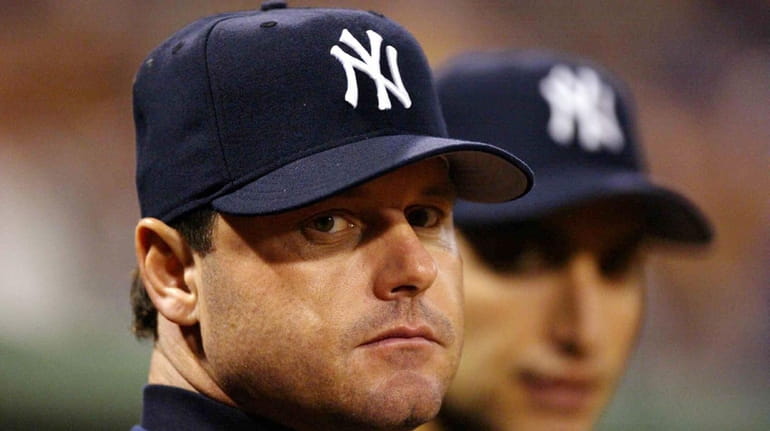Please, Baseball Hall of Fame, drop the character and integrity clauses

Roger Clemens of the New York Yankees before the start of Game 4 of the 2003 ALCS against the Boston Red Sox on Oct. 13, 2003 at Fenway Park. Credit: Getty Images / Ezra Shaw
The twisted logic that goes into the Baseball Hall of Fame selection process these days is like something out of a Kurt Vonnegut novel. And by the time the actual winners are announced? Baseball’s newest immortals end up getting less publicity than a dozen or so Baseball Writers’ Association of America members who either a) submitted a blank ballot in protest, b) abstained from voting on principle or c) tragically confused one with the other.
No problem, right? Because that’s what the museum in Cooperstown is all about. Media vendettas, personal agendas and grandstanding BBWAA voters. And lest we forget, how many eyeballs and web hits those opinions deliver.
But as screwy as the balloting has become since the Steroid Era delivered its first batch of candidates, it’s still a tremendous boon for everyone involved. The Hall receives almost daily publicity for nearly two months from the increasingly contentious debate and the BBWAA, which is trying to maintain its footing in an ever-changing media landscape, enjoys a greater relevance than at any other point in the year.
If you’re wondering how important that is, tell us something about any other sport’s Hall of Fame, aside from where they’re located. It’s a brief discussion, usually limited to two days of the year — when the list of candidates is announced and then the induction. That’s why you won’t hear any outrage from the Hall or Major League Baseball, regardless of the BBWAA’s missteps. It’s a perfect third-party arrangement, with the BBWAA propped up in the dunking booth, gladly getting soaked, over and over, by well-aimed fastballs thrown by their detractors.
In a conversation the other day, someone asked if this was the “right” way to determine Hall inductees, as if we were choosing a president or prime minister. But to paraphrase Winston Churchill, the BBWAA model is the worst way to vote for the Hall, “except for all the others.”
What we would suggest going forward, however, is a deregulation of the process. If the Hall of Fame truly is comfortable with the BBWAA choosing who deserves a plaque in Cooperstown, especially in this current PED-laced minefield, then let us cast an uninhibited ballot, free of restrictions, by dropping any mention of “integrity,” “sportsmanship” and “character.”
Don’t worry. We’ll keep the rest. And the edited version would then read, “Voting shall be based upon the player’s record, playing ability and contributions to the team(s) on which the player played.” Period. That’s it.
Before you get crazy, that still allows BBWAA members to vote however they want. If they believe a player cheated, and that disqualifies them, so be it. But no more hiding behind the Hall’s so-called “character clause” or using it as a shield against the public outcry. There’s been enough hand-wringing over the crimes against humanity a baseball player has committed — or is under suspicion of committing — by using performance-enhancing substances at one time or another.
Maybe that won’t affect the process, but it should be allowed to. Look at the blowback from Bud Selig’s election to the Hall last month. Even though the former commish was voted in by a special 16-member committee — not the BBWAA — many used his collusion-stained record and the PED proliferation under his watch to open the door for Barry Bonds and Roger Clemens. Did that mean Selig was given immunity from the same “integrity” stipulation that has blackballed a handful of players from that era? Some certainly saw it that way and voted accordingly this year.
We’ve always checked the boxes next to Bonds and Clemens, so it didn’t matter. Because Selig was given his Hall pass by a different entity than the BBWAA, we don’t really buy the correlation anyhow. Others used the loophole to switch their once unwavering stance on Bonds and Clemens, however — correcting a mistake, in our opinion. It’s probably best to have a flexible morality in this shifting climate, and the only constant among BBWAA voters is they persistently assert the right to change their mind.
Which then, of course, leads to even greater debate — and more TV ratings, and more digital page views. It’s all good. And amid the wreckage of this ethical hurricane, we’re hoping this eventually leads to Bonds and Clemens stepping to that July podium at Cooperstown.
Their on-field resumes are certainly worthy of such an honor. And for the rest of us, it’s what we all deserve, really. For better or worse.


